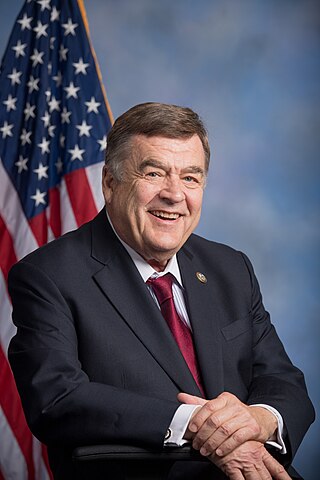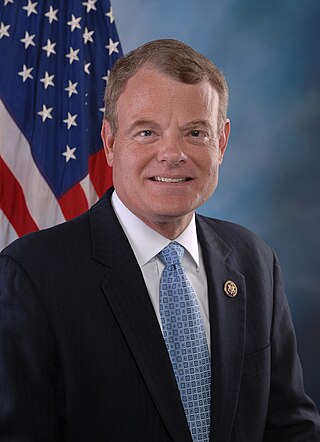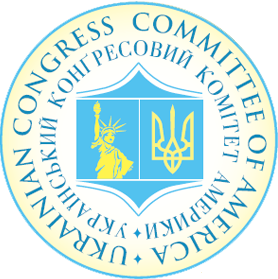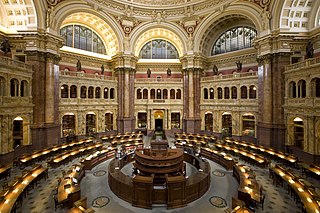Related Research Articles

The president of the United States (POTUS) is the head of state and head of government of the United States of America. The president directs the executive branch of the federal government and is the commander-in-chief of the United States Armed Forces.

The United States Congress is the legislature of the federal government of the United States. It is bicameral, composed of a lower body, the United States House of Representatives, and an upper body, the United States Senate. It meets in the United States Capitol in Washington, D.C. Members are chosen through direct election, though vacancies in the Senate may be filled by a governor's appointment. Congress has 535 voting members: 100 senators and 435 representatives. The vice president of the United States, as President of the Senate, has a vote in the Senate only when there is a tie. The House of Representatives has six non-voting members.

The United States Department of State (DOS), or simply the State Department, is an executive department of the U.S. federal government responsible for the country's foreign policy and relations. Equivalent to the ministry of foreign affairs of other nations, its primary duties are advising the U.S. president on international relations, administering diplomatic missions, negotiating international treaties and agreements, and representing the U.S. at the United Nations. The department is headquartered in the Harry S Truman Building, a few blocks from the White House, in the Foggy Bottom neighborhood of Washington, D.C.; "Foggy Bottom" is thus sometimes used as a metonym.

The federal government of the United States is the common government of the United States, a federal republic located primarily in North America, comprising 50 states, five major self-governing territories, several island possessions, and the federal district of Washington, D.C., where the majority of the federal government is based.

Charles Albert "Dutch" Ruppersberger III is an American lawyer and politician serving as the U.S. representative for Maryland's 2nd congressional district since 2003. A member of the Democratic Party, he served as an assistant state attorney of Maryland from 1972 to 1980, a Baltimore County councilman from 1985 to 1994, and Baltimore County Executive from 1994 until 2002. He was the ranking member of the United States House Permanent Select Committee on Intelligence from 2011 to 2015.

Christopher Van Hollen Jr. is an American attorney and politician serving as the junior United States senator from Maryland since 2017. A member of the Democratic Party, Van Hollen served as the U.S. representative for Maryland's 8th congressional district from 2003 to 2017.

The United States Intelligence Community (IC) is a group of separate U.S. federal government intelligence agencies and subordinate organizations that work both separately and collectively to conduct intelligence activities which support the foreign policy and national security interests of the United States. Member organizations of the IC include intelligence agencies, military intelligence, and civilian intelligence and analysis offices within federal executive departments.

The District of Columbia statehood movement is a political movement that advocates making the District of Columbia a U.S. state, to provide the residents of the District of Columbia with voting representation in the Congress and complete control over local affairs.

The United States Senate Select Committee on Intelligence is dedicated to overseeing the United States Intelligence Community—the agencies and bureaus of the federal government of the United States that provide information and analysis for leaders of the executive and legislative branches. The Committee was established in 1976 by the 94th Congress.

Douglas Carmichael "Mike" McIntyre II is an American attorney and politician who was first elected to represent North Carolina's 7th congressional district in the U.S. House of Representatives in 1996. He served for 18 years from 1997 to 2015. McIntyre is a Democrat and, during his tenure in the House of Representatives, was a member of the Blue Dog Coalition.

Voting rights of citizens in the District of Columbia differ from the rights of citizens in the 50 U.S. states. The United States Constitution grants each state voting representation in both houses of the United States Congress. It defines the federal district as being outside of any state, and does not grant it any voting representation in Congress. The Constitution grants Congress exclusive jurisdiction over the District in "all cases whatsoever".
The powers of the president of the United States include those explicitly granted by Article II of the United States Constitution as well as those granted by Acts of Congress, implied powers, and also a great deal of soft power that is attached to the presidency.
Congressional oversight is oversight by the United States Congress over the executive branch, including the numerous U.S. federal agencies. Congressional oversight includes the review, monitoring, and supervision of federal agencies, programs, activities, and policy implementation. Congress exercises this power largely through its congressional committee system. Oversight also occurs in a wide variety of congressional activities and contexts. These include authorization, appropriations, investigative, and legislative hearings by standing committees; which is specialized investigations by select committees; and reviews and studies by congressional support agencies and staff.
Title 2 of the United States Code outlines the role of Congress in the United States Code.

The Ukrainian Congress Committee of America or UCCA is a non-partisan non-profit national umbrella organization uniting 30 national Ukrainian American organizations in advocating for over 1,000,000 Americans of Ukrainian descent. Its membership is composed of fraternal, educational, veterans, religious, cultural, social, business, political and humanitarian organizations, as well as individuals. Established in 1940, the UCCA maintains local volunteer chapters across the United States, with a national office based in New York City, as well as a Washington, D.C., news bureau, the Ukrainian National Information Service. The humanitarian aid committee, the United Ukrainian American Relief Committee, is headquartered in Philadelphia, Pennsylvania.
United States Intelligence Community Oversight duties are shared by both the executive and legislative branches of the government. Oversight, in this case, is the supervision of intelligence agencies, and making them accountable for their actions. Generally oversight bodies look at the following general issues: following policymaker needs, the quality of analysis, operations, and legality of actions.
An earmark is a provision inserted into a discretionary spending appropriations bill that directs funds to a specific recipient while circumventing the merit-based or competitive funds allocation process. Earmarks feature in United States Congress spending policy, and they are present in public finance of many other countries as a form of political particularism.

The Library of Congress (LOC) is a research library in Washington, D.C. that serves as the library and research service of the U.S. Congress and the de facto national library of the United States. It also administers copyright law through the United States Copyright Office.

The United States House of Representatives is the lower chamber of the United States Congress, with the Senate being the upper chamber. Together, they compose the national bicameral legislature of the United States. The House is charged with the passage of federal legislation, known as bills; those that are also passed by the Senate are sent to the president for signature or veto. The House's exclusive powers include initiating all revenue bills, impeaching federal officers, and electing the president if no candidate receives a majority of votes in the Electoral College.

The Legislative Branch Appropriations Act, 2015 is an appropriations bill that would make appropriations for the United States Congress for fiscal year 2015. The bill is considered one of the two easiest appropriations bills to pass each year. The bill would appropriate $3.3 billion to the legislative branch for FY 2015, which is approximately the same amount it received in FY 2014.
References
- ↑ "Open World Leadership Center". Keystone Human Services. Retrieved 8 January 2016.
- ↑ "Message from the Executive Director". Open World Leadership Center. Retrieved 11 January 2016.
- ↑ "Open World Program Overview". American Councils for International Education. Retrieved 11 January 2016.
- ↑ "Open World Awards Grant to the U.S.-Ukraine Foundation". U.S.-Ukraine Foundation. Retrieved 11 January 2016.